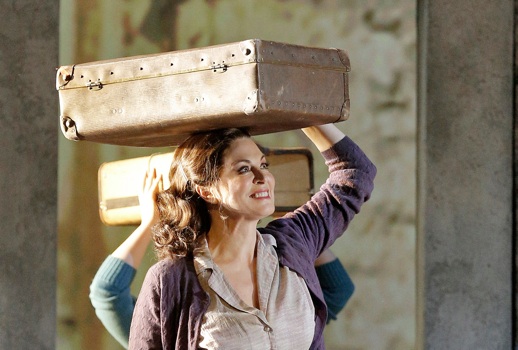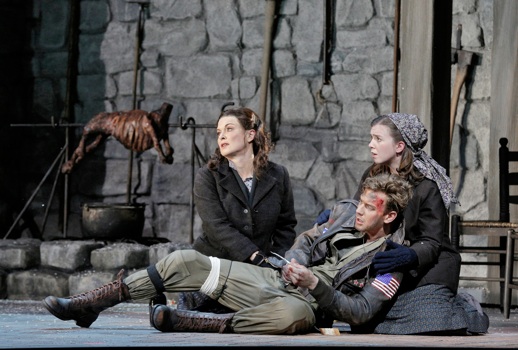

While I would still love to see La Ciociara, I do have a hunch that Marco Tutino’s opera has given me a flavor of it, and it’s a satisfying theatrical experience on its own strengths. The other virtue of ignorance here, with apologies to Alejandro Inarritu, may have been going in fresh, having forgotten that Francesca Zambello directed the production. Zambello’s work has not historically been a source of joy to me—I remember in particular the DC premiere of Rheingold in what would turn into the San Francisco American Ring Cycle, for which the term “heavy-handed” was invented.
In the present production, Zambello has gotten pretty much everything right, though one scene of a snowy mountain did call to mind the screensaver aesthetic of that Rheingold, so strikingly did it resemble the iphone app “Mountain.” That aside, the staging managed to convey a startling degree of cinematic sweep, from the air raid of the first act to a frightening scene of wartime brutality in the second. Though characterizations tended toward the outsized, this was generally a virtue, and you could hardly blame Zambello for the mortifying fact that Friday night’s audience vociferously booed every singer who played an unsavory character.It may indeed be a credit to the thearical values, however embarrassing.
I suspect it will be said that Tutino’s music is derivative, and indeed there are gestures from the very opening of Two Women that hearken to the past so fully as to seem, for a moment, like quotations rather than references. (See if you don’t, however briefly, think you’re about to hear Act III of Tosca as Zanda Svede sings the folksy “Vojo canta cosi” and the woodwinds flirt with “E lucevan le stelle.”)
If postmodernism is still a thing, though, this is it, and the invocation of lyrical/romantic modernism is an eclectic one that evokes film music as much as it does Puccini. I’ll be damned if I’m going to side with the kind of anti-intellectualism that damns everything new or challenging, but I’m forced to admit that Tutino’s score has an immediate advantage over any post-Nixon-in-China work I can recall hearing in an opera house—not in that the music is accessible, I think, so much as that the vocal lines are recognizably operatic. This, and not easy tonal melody is what is missing in many new commissions—one thinks, for instance of Wuorinen’s recent Brokeback Mountain, or rather, one does not.

And what an ensemble! Now is probably as good a time as any to tell you all that I’m quite cross with you for not mentioning Sarah Shafer to me, though it appears her career is a young one so you are perhaps off the hook. Ms. Shafer has a bright, substantial lyric voice and fine dramatic instincts. As Cesira’s naive daughter Rosetta, she turned in a tour de force performance with a satisfying arc. We will be hearing more from her, without a doubt. Dmitri Pittas, whose production has not always struck me as the very freest, sounded at home in Tutino’s neo-verismo or whatever we’re calling it, and made of Michele something more complex than the martyr he could easily be.
Christian “I’m In Every Opera This Season” van Horn was, for once, not coiffed up as Sauron from those Hobbit movies and, as always, made with the vocal suavity. Mark Delavan, as the sociopathic opportunist Giovanni (an invention of the librettist not to be found in the source material) has worn places in his voice but remains a formidable artist and a riveting heavy.B oth were good sports about the audience’s temporary regression to early childhood during curtain calls. Adler Fellow Edward Nelson was another happy surprise in the short but pivotal role of John Buckley, an Air Force lieutenant. Nicola Luisotti, in the pit, easily followed the score’s sometimes sudden veers from art song to pop song.
Briefly noted—I missed some of the announcement, but I think it may be a new program this season: at selected performances, curtains are left open for the audience to watch and even photograph scene changes. Fascinating to observe, and a fine idea!
Photos ©Cory Weaver/San Francisco Opera


























Comments